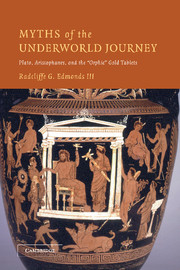Book contents
- Frontmatter
- Contents
- Preface
- 1 Introduction: The Start of the Journey
- 2 Roadmaps of Déviance: The ‘Orphic’ Gold Tablets
- 3 Descent to the Depths of Comedy: The Frogs of Aristophanes
- 4 The Upward Path of Philosophy: The Myth in Plato's Phaedo
- 5 Conclusions: The End of the Road
- Bibliography
- Index Locorum
- Index
4 - The Upward Path of Philosophy: The Myth in Plato's Phaedo
Published online by Cambridge University Press: 13 October 2009
- Frontmatter
- Contents
- Preface
- 1 Introduction: The Start of the Journey
- 2 Roadmaps of Déviance: The ‘Orphic’ Gold Tablets
- 3 Descent to the Depths of Comedy: The Frogs of Aristophanes
- 4 The Upward Path of Philosophy: The Myth in Plato's Phaedo
- 5 Conclusions: The End of the Road
- Bibliography
- Index Locorum
- Index
Summary
INTRODUCTION
Socrates' Final Myth of Hades
“And that, Echecrates, was the end of our companion, a man, who, among those of his time we knew, was – so we should say – the best, the wisest too, and the most just.”
Plato's Phaedo ends with this encomium of Socrates, and the dialogue is an illustration of these claims, portraying Socrates as a hero of philosophy who pursues its ideals up to the final moments of his life. Plato's character of Socrates in the Phaedo, whatever its relation to the actual historical Socrates, provides a model for the philosophic way of living that Plato advocates. The details of his last day of life, especially his conversations with his closest friends, serve as a medium for Plato to outline the nature and importance of what he calls philosophy. Socrates, as he contemplates the fate of his own soul after death, serves as a model for the philosophic life, a life concerned always with the realm of the unseen (τò ιδές).
A philosopher to the end, Socrates spends his final hours in philosophic debate with his closest companions, discussing the nature of the soul and attempting to prove its immortality. After engaging in a series of fairly abstract dialectic arguments concerning the nature of the soul, Socrates concludes his arguments with a myth, a narrative describing the fate of the soul after death, as it tries to make its journey to the realm of the dead (“Aιδōυ). How does this myth fit in with the dialectic arguments? Many modern scholarly philosophical treatments of the dialogue simply ignore the final myth, treating it as a kind of optional extra, devoid of serious philosophical content.
- Type
- Chapter
- Information
- Myths of the Underworld JourneyPlato, Aristophanes, and the 'Orphic' Gold Tablets, pp. 159 - 220Publisher: Cambridge University PressPrint publication year: 2004



